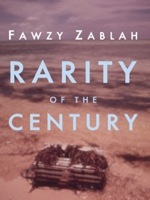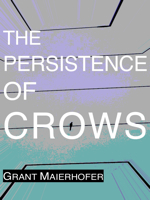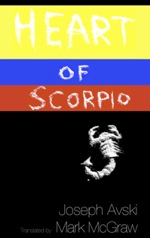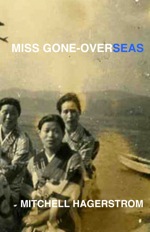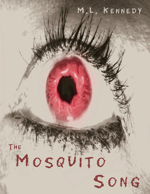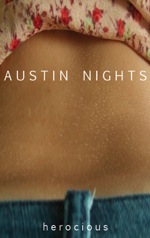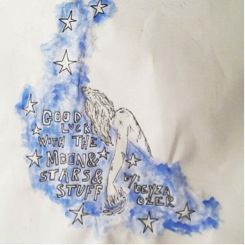 Available from C.A. Mullins’ independent Bottlecap Press, Beyza Ozer’s chapbook is the sort of artifact that you know right away is special. Good Luck with the Moon & Stars & Stuff (2015) bubbles with brilliance, personal insight, and that ever-eternal theme: love. There is an abundance of love for life, others, friends, family members, strangers, a significant other. But not all is sunshine and awkward happiness; these pieces delve into uncomfortable, harsh territory: rejection, death, familial unhappiness, homelessness, the desire to do good but the inability to do so… Beyza’s poems speak from experience and bring an authenticity to city-life and city-love circa 2014. In fact, probably the biggest issue Beyza peripherally examines is the very contemporary Gender, for both Beyza and the chapbook’s personae refer to themselves via “they/them” terminology. For the pieces’ personae, this non-binary gender terminology is more than a stylistic choice; rather, the decision serves two functions: 1) to provide insight into the lives of those who do not identify with the His/Her gender binary; and 2) to bring the complexities of gender to the forefront without making those complexities the sole issue or point of the poems. That is, Beyza’s spectacular poems and stories make the reader think about gender and sexuality without coming right out and discussing gender and sexuality in an academic or “stuffy” way. It’s a technique that few can pull off, but Beyza accomplishes this technique deftly.
Available from C.A. Mullins’ independent Bottlecap Press, Beyza Ozer’s chapbook is the sort of artifact that you know right away is special. Good Luck with the Moon & Stars & Stuff (2015) bubbles with brilliance, personal insight, and that ever-eternal theme: love. There is an abundance of love for life, others, friends, family members, strangers, a significant other. But not all is sunshine and awkward happiness; these pieces delve into uncomfortable, harsh territory: rejection, death, familial unhappiness, homelessness, the desire to do good but the inability to do so… Beyza’s poems speak from experience and bring an authenticity to city-life and city-love circa 2014. In fact, probably the biggest issue Beyza peripherally examines is the very contemporary Gender, for both Beyza and the chapbook’s personae refer to themselves via “they/them” terminology. For the pieces’ personae, this non-binary gender terminology is more than a stylistic choice; rather, the decision serves two functions: 1) to provide insight into the lives of those who do not identify with the His/Her gender binary; and 2) to bring the complexities of gender to the forefront without making those complexities the sole issue or point of the poems. That is, Beyza’s spectacular poems and stories make the reader think about gender and sexuality without coming right out and discussing gender and sexuality in an academic or “stuffy” way. It’s a technique that few can pull off, but Beyza accomplishes this technique deftly.
Perhaps the piece in Beyza’s chapbook that most obviously makes apparent the issues of pronoun-identity is “The First Short Story,” wherein the main character is referred to as “the person” and signified by “they/them” pronouns. But, as previously stated, the issues of gender and sexuality are of less direct interest to Beyza and the story than that which occurs; namely, touches of melancholy from different forms of rejection. The person of the story is continually described as “not amused,” both with the man who indubitably made a pass at them and then also in general. There are two important elements to note in this short story: smiles and blood. It is when the person gives the man a half-smile that something happens (i.e. he is made to leave the bar) and then, on the street, when the man tastes the solution of his own blood and tears, he smiles, which not only signifies another type of exit (i.e. the man from the story) but also brings us to the element of blood. Blood, in this story, represents a lack or rejection of the possibility of love. For the man, he is rejected by the person at the bar, indicated by the person having stabbed him in the ears with plastic cocktail swords, which is an allusion to verbal rejection and the blood alludes to the loss of the possibility of love. Granted, the man in the story is said to have said something crude and probably deserved to be rejected, but then, in the street, he smiles when he tastes his blood mixed with his tears, which may signify that, while painful to be rejected, it may have been beneficial for the man to be told NO, to be restricted, to be informed that he is not entitled to anything or anyone he happens to meet or fancy. Perhaps then, in this way, he is able to develop, mature. At the end of the story, the person is also cut and bleeds; this time, however, the cutting is done because of a loose bedspring, which again represents a lack of love, but for the person who must face an empty, lonely night. Indeed, the symbol of pierced flesh and subsequent bleeding implies that rejection and/or a lack of love is painful and draining in a way akin to blood loss. The earthquake, which is the story’s other major element, occurs while the person is bleeding in bed, an event which opens and closes the story, which itself opens the chapbook, and serves a larger purpose: the shaking of convention, of what is expected of individuals and issues of love, which will be violent and destructive, and, as such, brings a purposeful smile to the person’s face.
Moving from this short story to the poems, the theme of melancholic love takes front-and-center stage. “Motherfucker I’m Ill,” which first appeared in Zoomoozophone Review, ends in a humorously self-referential fashion, which might have been clunky in another’s hands, but Beyza’s life-loving, exuberant writing pulls it off masterfully. Furthermore, there is nothing but love for the poem’s titular “motherfucker,” although said love is tinged with melancholy by the fact that “motherfucker” is dead. The next poem, “Let’s Just Forget,” builds itself up out of divergent, scattered thoughts, each of which are stitched together by love, happiness, and quirky observations. Rightly so, since Beyza’s poetry is informed by, not just love, but quirkiness and exuberance of life; see: “[fireflies are / tiny bugs with / stars trapped / in their bellies].” As for quirkiness, the flarf-esque “Screen Shot 2014-11-20 at 9.09.20 PM.png” is primarily the copy/pasted titles of craigslist postings, mainly of a sexual nature. But honestly, who hasn’t cruised craigslist to do a little people watching? Beyza, however, intriguingly takes this pastime one step further by stitching together different titles in order to show the complexity of modern human sexuality alongside the depth of each person’s need to find companionship, geologically located in Chicago and the upper-Chicagoland area.
“I Think Meditation Is Bullshit” widens in thematic scope by seemingly showing the folly of western society’s emphasis on over-thinking, whereby the poem’s persona ends up having a panic attack and hyperventilating, which humorously undermines the persona’s anti-meditation stance. But the workings of a mind quirkily churning are evident in each of these poems, such as the thought of gifting antlers for a beloved after sharing a nighttime deer experience in “Bambi Complex.” That working mind is often fixated on a “you,” a beloved, who often prompts the thoughts and reflections of each poem’s speaker. Think of the pigeon in “Pigeon Love Poem,” who could be a pet-named lover or an actual pigeon sitting on a train platform; or consider the person addressed in “Tread Well;” or the person whose absence is so sharply felt in “Missing.” In “Dear Isabelle,” a love letter/poem to Beyza’s irl partner, Isabelle is referred to repeatedly as a “Human Sunflower,” which is not only beautiful but also contains the erotic implications of chewing on that sunflower’s petals and subsequently being stained or intoxicated by their yellowness. But immersion in a person or mode of thought can be seen in Beyza’s other poetry; for example, the surreal, dream-logic of “Population: 51,201,” which is a fitting nod to David Lynch’s Twin Peaks. Furthermore, this sort of dream-like quality informs much of Beyza’s writing, such as the mouth bees in “We Had the Time.”
Despite the chapbook-defining emphasis on romantic love, there are pieces which focus on love of different kinds. For one, the love of parents is examined in two poems: that of the father in “Skeletons” and that of the mother in “Mom.” In the former, the poem’s persona reflects upon a memory of a trip made into Chicago to the Field Museum with their father and cousin, the reflection giving way to a small revelation which is not quite expressed, but present on the tip of the tongue. In “Mom,” a person on the verge of adulthood tries to find common ground with their mother, a task which is far from easy, especially given the implications of the chapbook’s other pieces (chiefly the cultivation of a sexual/gender identity that is quite different from that of one’s mother). This makes “Mom” all the more necessary, since it delves into uncomfortable familial territory, which then must, and graciously does, end with one of the chapbook’s most beautiful expressions of love: “I want to grow you the bluest ocean.” But perhaps the most heart-wrenching expressions of love for humanity can be found in “Eventide,” which will tug on the heartstrings of anyone who has had similar experiences and feelings for the homeless. Beyza’s stirring piece, however, makes the number 3 important: there are 3 dollars in the person’s wallet, about 3,000 in their bank, and (most significantly) 3 types of people: the dehumanized people who must ask others for help, the people who want to help but are unable, and the stonefaced people who may have the ability to help and yet do not.
Beyza’s writing sings exuberantly, celebrating life and love, happiness and loneliness; all of life’s complexities. From fireflies and pigeons to planets and solar systems, Beyza’s writing encompasses everything about life and spins it charmingly for the reader to contemplate. Whether fantasizing about the ideal death in “Summer’s Blood” or relating the disappointment of a love’s uncertainty in “The Second Short Story,” Beyza’s writing unflinchingly lives an examined life, embracing each situation and every outcome. In a way, this exuberance of life can be summed up in the title of the poem called “So Much Working, Reading, Thinking, Living to Do! A Lifetime Is Not Long Enough.” Apart from love, the other major element in Beyza’s chapbook is the ever-continuous workings of a contemplative mind. Consider “Ribs,” which examines a deep, desirous love of and for the beloved; so much love trapped within the persona’s titular cage that there isn’t even time for real line breaks, merely slashes where those breaks should be. This heightening of love and exuberance of life are the carrying themes of this chapbook, available from C.A. Mullins’ Bottlecap Press. Beyza’s Good Luck with the Moon & Stars & Stuff rightly celebrates life and love in the form of an individual who exalts life and seeks love.
 AUTHOR BIO:: dom schwab is a reader/writer of poetry/prose. dom is gay, GQ w/ no pronoun preference, a vegetarian, and lives in Chicago. dom’s most recent work has appeared in Zoomoozophone Review’s female/non-gender-conforming Issue 5, Boscombe Revolution Issue 3: Revolution & Gender, and JunkYard Kool, an anthology presented by Kool Kids Press.
AUTHOR BIO:: dom schwab is a reader/writer of poetry/prose. dom is gay, GQ w/ no pronoun preference, a vegetarian, and lives in Chicago. dom’s most recent work has appeared in Zoomoozophone Review’s female/non-gender-conforming Issue 5, Boscombe Revolution Issue 3: Revolution & Gender, and JunkYard Kool, an anthology presented by Kool Kids Press.



